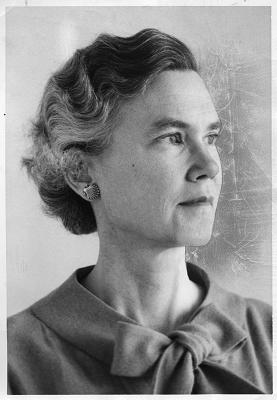Priscilla Robertson, 1910-1989

“The first thing I desire for my children is a kind of openness to experience. I hardly know whether to call this openness the ability to love or the ability to perceive truth, for it is both.”
Priscilla Robertson was born Priscilla Smith in Paris, France, in 1910. Her father, Preserved Smith, was a historian, and her mother was, in Robertson’s words, a “cheerful Christian” who died when her daughter was just three-years-old. Robertson’s father then raised Priscilla without any religion (his own father was a biblical scholar tried for heresy in 1892) and built a house for them in New England where she grew up.
In 1930 Robertson graduated from Vassar College, where her research had focused on nineteenth-century history and the history of women and family life. She then worked as an organizer with the Southern Tenant Farmer’s Association. Later she was the literary editor of the Louisville Courier-Journal, where her husband, Cary Robertson, was the long-time Sunday editor. They had three children and lived on a farm in Kentucky, where they raised beef and tobacco. During this time she published Lewis Farm: A New England Saga (1950) and Revolutions of 1848: A Social History (1952), which the New York Times described as “in the best tradition of what, in a word perhaps significantly beginning to be overworked, we must call humanism.” She also helped found the Kentucky Humanities Council and the Kentucky League of Women Voters.
After serving for two years as an associate editor at the Humanist magazine, Robertson took over the editorship in 1956. In her introductory column as editor in the May/June issue, Robertson pledged that the magazine would “work at a small part of the huge task of turning knowledge into wisdom.” During her tenure she published work by Nobel laureate H.J. Muller, psychologist Abraham Maslow, and science fiction writers Miriam A. DeFord and Isaac Asimov. She herself contributed numerous reviews and articles, including a series on the relationship between science and values. Writing on that subject in a 1952 Harper’s magazine piece titled, “What Shall I Tell My Children?” Robertson wrote: “True, it is harder to be a good person than a good scientist–there can be a carry-over from the laboratory but it is not automatic; hence the common remark that scientific judgment is no good in human affairs. But the discipline in either case consists in so great a willingness to let truth be true, and people be people, that you are willing to fight for this autonomy.”
In March 1959, Robertson was dismissed by the Board of Directors of the American Humanist Association. According to Warren Allen Smith, the Humanist’s book editor at the time, the dismissal stemmed from an editorial disagreement over rushing the publication of an article by Corliss Lamont. As a consequence, the magazine’s staff (including Mr. Smith) resigned en masse in a show of support, as did several associate editors.
Robertson went on to teach at the Indiana University campuses in Bloomington and Jeffersonville, as well as at Harvard University, and two now-defunct schools, the Louisville School of Art and Kentucky Southern College. In 1982 she published An Experience of Women: Pattern and Change in 19th-Century Europe.
Priscilla Robertson died of a stroke on November 26, 1989, in Louisville, Kentucky, at the age of seventy-nine.
